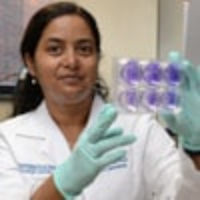Non-hemodynamic factors associated to the risk of developing hypertensive cardiopathy
Published on: 20th September, 2017
OCLC Number/Unique Identifier: 7286431107
Introduction: Hypertensive cardiopathy is the target organ lesion caused by arterial hypertension (HTN) that exhibits the highest morbidity and mortality rates. Although the importance of hemodynamic overload exerted by HTN on the onset of cardiopathy is well established, several non-hemodynamic factors may contribute significantly to its development.
Objective: To evaluate the influence of different non-hemodynamic risk factors in the development of hypertensive cardiopathy.
Methods: A prospective cohort study was carried out in hypertensive patients assisted at the specialized arterial hypertension physicians’ office of the “Carlos Manuel de Céspedes” Specialty Policlinic attached to the General University Hospital, Bayamo Municipality, Granma Province, Cuba from January 5, 2006 to December 31, 2015. The study included 18-to-55-year-old hypertensive patients with a stage 1 arterial hypertension diagnosis for less than a year1.
Results: The multivariate analysis showed a significant and independent relation among the majority of the factors studied and the risk of developing cardiopathy. The major factor was C-reactive protein (HR: 5.020; IC 95%: 3.383-7,448; p<0.005) followed by microalbuminuria (HR: 2.649; IC 95%: 1.932-3.631; p<0.005). The area under the model ROC curve was 0.887 (p<0,005).
Conclusions: The results showed that it is possible to estimate the risk of developing hypertensive cardiopathy with the application of the regression model to major risk factors.
Persistent hydronephrosis after pyeloplasty: Is it a true obstruction? The role of endourology
Published on: 13th April, 2020
OCLC Number/Unique Identifier: 8582316817
Introduction: Anderson-Hynes pyeloplasty remains the gold standard in the treatment of ureteropelvic junction obstruction. The diagnostic criteria for defining the failure of pyeloplasty are not well-defined or even arbitrary. Likewise, the ideal treatment of persistent hydronephrosis after pyeloplasty is not well established. We tested an innovative endourological procedure, which simultaneously allows a diagnostic definition of failure and treatment when necessary.
Materials and methods: The endourological procedure was applied prospectively to 13 cases from 2006 to 2015. The mean hydronephrosis was 3 cm and all the patients showed an obstructive pattern at scintigraphie. Of these, only 2 patients had symptoms. The procedure consisted in the endoscopic calibration of the pyeloureteral junction. In case of confirmed persistent stenosis, the procedure continued with the high pressure dilation of the junction. The calibration/dilation procedure was carried out with a balloon catheter, previously used for high pressure dilation in the obstructive megaureter. In all patients, a ureteral stent was positioned for 6 - 8 weeks.
The patients were then followed up using ultrasound and renoscintigraphie.
Results: According to the endoscopic balloon procedure, anastomosic stenosis was confirmed in 3 cases, treated with high pressure dilation during the same procedure. In 10 cases no stenosis was found and we followed-up these patients with periodic ultrasound and scintigraphie.
Conclusion: The calibration/dilation of the pyeloureteral junction represents in our opinion a useful diagnostic and therapeutic tool that allows to limit the repetition of open surgery only to symptomatic cases and those non-responders to endoscopic treatment.
Infection by SARS-CoV-2 in healthcare workers of a second level hospital
Published on: 6th May, 2022
Background: From the first COVID-19 case in Playa del Carmen, 370 cases of infection have been reported in our staff until December 31, 2020. Material and methods: Study in workers of the General Hospital who developed SAR-CoV-2 infection during the pandemic. A sample of 30 cases of both sexes with laboratory-confirmed infection was obtained. Descriptive statistics were used with measures of central tendency, dispersion and percentages. Results: In a sample of 30 workers there were 13 doctors, 6 nurses and 11 support workers. The age was obtained as a mean of 38.8 years and SD = 10.4. Only four risk factors were found. Of the 30 infected health workers, 27 were treated on an outpatient basis and three required hospitalization. Discussion: The main symptoms in health workers are alterations in the sensation of taste and smell, but unlike our study, was headache, fever and myalgia. Likewise, it has been observed that medical are the most affected, but in this study it was support and the least affected was nursing personnel. There is no doubt that asymptomatic carriers are a serious disease transmission problem such that transmission between health workers by asymptomatic carriers is possible as was observed in this analysis.
COVID-19 related rhabdomyolysis
Published on: 20th October, 2020
OCLC Number/Unique Identifier: 8691888726
A novel coronavirus known as Severe Acute Respiratory Syndrome Coronavirus 2 (SARS-CoV-2) with a high rate of human-to-human transmission has emerged, resulting in a worldwide public health crisis of catastrophic proportions. Common initial symptoms of Coronavirus Disease 2019 (COVID-19) include fever, cough, fatigue, myalgia, and shortness of breath. Complications include acute respiratory distress syndrome (ARDS), acute cardiac injury, acute kidney injury, and secondary infections [1,2]. There have been reports of patients infected with COVID-19 who either presented with muscle pain and rhabdomyolysis or developed muscle damage as a late complication during hospitalization [3-8].
Modification of the Renal Angina Index for identifying the need for renal replacement therapy in critically ill pediatric patients
Published on: 2nd November, 2020
OCLC Number/Unique Identifier: 8769657642
Severe Acute Kidney Injury (AKI) is a common, serious problem affecting critically ill children that lacks effective treatment options. Currently, there are no treatment options for AKI other than supportive care. Continuous renal replacement therapy (CRRT) is employed to reduce Fluid Overload (FO) burden and treat metabolic disturbances in AKI. Identifying patients upon admission who may require CRRT has potential clinical care implications. The aim of this study was to determine if the RAI had diagnostic capabilities to identify patients who would require CRRT.
The analytic cohort consisted of patients who required CRRT and illness severity score matched controls who did not require CRRT at a single center. Patients who required CRRT had higher mortality rates, length of stay, and use of ventilatory and inotropic support. Sensitivity, specificity and area under the receiver operating characteristic curve (AUC) assessed and compared the discriminatory accuracy of three scores: 1) the renal angina index (RAI), 2) serum-creatinine (sCr) based AKI on day 0 and 3) modified RAI created with an additional RAI injury tranche that corresponded to severe stage 3 AKI sCr elevation.
Compared to Day0AKI (AUC 0.78, 0.70-0.87; sensitivity 0.63, 0.45-0.79; specificity 0.93, 0.870.97) and RAI (AUC 0.76, 0.69-0.82; sensitivity 0.94, 0.81-0.99; specificity 0.57, 0.47-0.66), the modified RAI had the highest AUC (0.79; 0.72-0.85) with a high sensitivity (0.91; 0.77-0.98) and moderate specificity (0.65; 0.56-0.75) for prediction of CRRT requirements. As a more accurate tool for discriminating patients in need of CRRT, a modified RAI has numerous potential implications. Identifying patients who ultimately require CRRT at an earlier timepoint may influence timing of CRRT initiation in an attempt to avoid further FO, or may influence nephrotoxin administration. The diagnostic capabilities of the modified RAI may be refined by the addition of urinary biomarkers. These findings should be validated in a larger cohort.
Unusual presentation of oxalate nephropathy causing acute kidney injury: A case report
Published on: 4th November, 2020
OCLC Number/Unique Identifier: 8769674497
Oxalate nephropathy due to Hyperoxaluria and elevated serum oxalate level is a well-known cause for interstitial fibrosis, and ESRD. Conditions associated with high serum Oxalate, should be considered as a possible contributing factor for a patient’s tubular injury.
Well known cause for Hyperoxaluria including enteric Hyperoxaluria (due to gastric bypass, chronic pancreatitis, small Bowel resection, or malabsorption, as well as depletion of enteric oxalate-degrading bacteria [e.g., Oxalobacter). Other known causes of oxalate nephropathy include primary Hyperoxaluria, ethylene glycol intoxication, vitamin B6 deficiency, excessive ingestion of vitamin C or dietary substances rich in oxalic acid, aspergillosis, prolonged renal failure and various drugs (e.g., Known medications to cause Oxalate Nephropathy are: Orlistat, Praxilene, COX-2 inhibitors).
Unusual presentation with Acute Kidney Injury with incidental finding of high serum Oxalate in a patient with a known CKD stage III, recently started on Polyethelene Glycol to treat his constipation.
Review on impacts of COVID-19 pandemic on life animals and dairy product processing industries of the world
Published on: 22nd May, 2020
OCLC Number/Unique Identifier: 8617040327
This review was conducted for the objective of assessing causes of COVID-19 pandemic impacts on life animals and dairy product processing industry of the world. Since its outbreak in Wuhan town of China, the newly emerged strains of corona virus COVID-19 causes incredible crisis both on life animal and its product especially dairy industry of the globe. During the outbreak of the virus, majority of the world people were stayed home to prevent the spread of the diseases. At that time, the wildlife found in the zoo were exposed to diseases and missed human attention, global wildlife trade was spotlighted and wildlife was running… wild. For the reason of COVID-19 pandemic, many schools and restaurants which received dairy product from dairy producers and cooperatives were shutdown. Due to schools and restaurant shutter, milk supply chain was disrupted. For this moment milk demand and supply was decreased, huge volume of milk was dumped, mode of milk trade was changed, market and farm prices was fluctuated, import- export route was interrupted and Farm workforce absenteeism were some of the challenges cases dairy industry crisis. Trade law modification, provision of financial assistance for dairy industry and farmers, and expansion of export route were the measures taken by concerned bodies to save dairy industry from corona virus crisis. Therefore, COVID-19 pandemic is the disaster diseases which causes social and economic crisis on dairy producers of the world. So, to save wildlife and dairy industry from corona virus crisis, global solidarity prevention is mandatory.
Urinary NGAL incorporation into Renal Angina Index for early detection of acute kidney injury in critically ill children
Published on: 31st May, 2019
OCLC Number/Unique Identifier: 8165276515
Background and objectives: New AKI biomarkers (on the top of it NGAL biomarker) have demonstrated better performance for prediction of AKI in critically ill patients with heterogeneous illness. Renal angina index was recently reported to enhance prediction of severe AKI at the time of intensive care unit admission. This study tested the hypothesis that incorporation of uNGAL in patients with renal angina improves the prediction of severe AKI.
Design, setting, participants & measurements: In our study 53critically ill children admitted to the pediatric intensive care unit in Zagazig university hospital, Measurement of urine neutrophil gelatinase– associated lipocalin (uNGAL) was determined individually by ELISA kit and in combination with the RAI which is calculated in each critically ill child for severe AKI. Statistical analysis was done for these data.
Results: Individual uNGAL demonstrated marginal discrimination for severe AKI (area under curve [AUC]: NGAL, 0.877), little higher than prediction by RAI (AUC=0.847). Incorporation of uNGAL significantly added to the renal angina index AKI prediction (AUC=0.847, increased to 0.893).
Conclusion: This study shows that incorporation of uNGAL into the RAI improves detection ability of severe AKI in critically ill children.
Localized intrapulmonary desmoplastic mesothelioma: A case report
Published on: 5th December, 2019
OCLC Number/Unique Identifier: 9272363213
Introduction: Desmoplastic Malignant Mesothelioma (DMM) is a rare histological subtype of sarcomatoid malignant mesothelioma arising most frequently in the pleura or peritoneum and less frequently in the lung parenchyma.
Patient concerns: A 52-year-old female with no apparent asbestos exposure was referred for consultation in our center after 1 month of cough and no concomitant symptoms of chest.
Diagnosis: Chest computed Tomography (CT) revealed a localized mass measuring 4.5 x 3.9 cm in the right lung middle lobe with inhomogeneous enhancement following injection of contrast, and without pleural lesions, considered a primary intrapulmonary desmoplastic mesothelioma.
Interventions: Surgical intervention was performed.
Outcomes: Following complete tumor resection, the patient declined to receive chemotherapy or radiotherapy. The final diagnosis of intrapulmonary desmoplastic mesothelioma was confirmed by pathological and immunohistochemical examination. In addition, no local tumor recurrence was observed within 10 months of follow-up.
Conclusion: Even elderly female patients with localized pulmonary masses without significant pleural lesions should not excluded the possibility of malignant mesothelioma in the lungs.
Alternate day outpatient hemodialysis schedule is the appropriate practical alternative schedule to improve patients’ outcomes
Published on: 27th June, 2019
OCLC Number/Unique Identifier: 8172423111
The rise in all-cause and cardiovascular mortality and hospitalization rates among the hemodialysis (HD) patients after the long weekly inter-dialysis interval is very impressive. In fact, there is an additional long-term morbidity risk besides this acute rise in mortality and hospitalizations that can be expected from the weakly exaggerated pre-dialysis peaks of the less risky hemodynamic and biochemical parameters. An approach for eliminating these long weekend inter-dialysis intervals is through the provision of the hemodialysis sessions on every other day (EOD) basis, regardless of the week days. This is likely to be both practical and cost-effective. Such EOD schedule can be introduced easily beside the ongoing thrice weekly HD schedule without disturbance of the HD unit work. The availability of EOD schedule would provide a healthier and cost-effective alternative schedule for those patients who can’t tolerate the weekend intervals and for those looking for maintaining their long-term health on the option of hemodialysis. In fact, with available data, medical staff is expected to encourage all patients to shift their HD to the EOD schedule.




